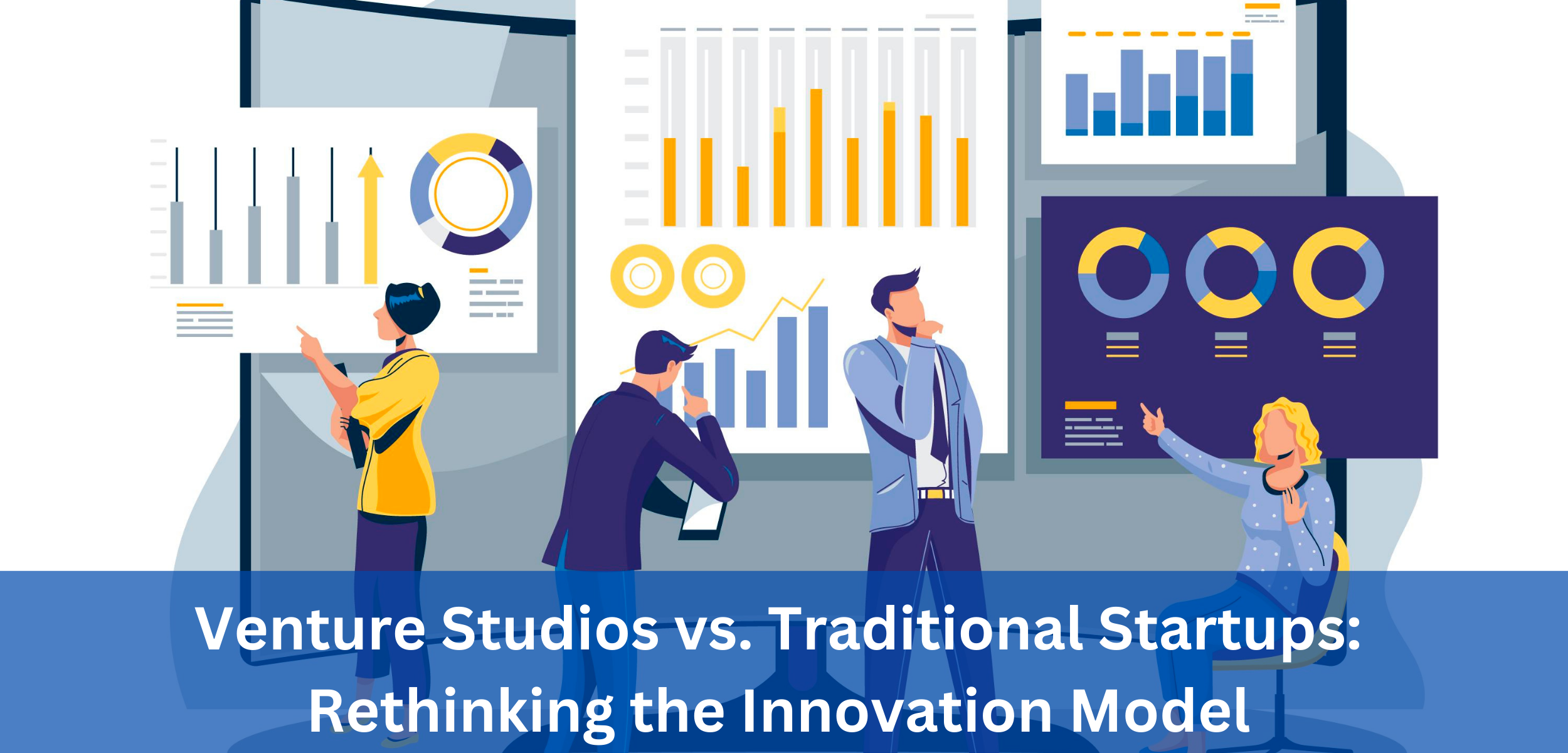Startups have traditionally followed a founder-led approach, where entrepreneurs develop ideas, secure funding, and grow their businesses. Venture studios offer a different model, providing resources, funding, and operational support from the start. As both approaches gain traction, understanding their strengths and weaknesses is essential for entrepreneurs and investors.
Venture studios create businesses from within, offering structured support and reducing risk, while traditional startups provide founders with full control and greater financial potential but come with higher uncertainty. This article provides a detailed comparison to help entrepreneurs, investors, and business leaders determine the best approach for their goals. It explores how each model operates, their funding structures, risk factors, and long-term scalability. By the end, you'll have a clear understanding of which path aligns best with your vision and resources.
What Are Venture Studios?
Venture studios create and launch multiple startups from within a single organization. They provide funding, expert teams, and strategic direction. Unlike incubators or accelerators, which help existing startups, venture studios develop ideas in-house and build businesses from scratch.
How Venture Studios Work
1. Idea Generation & Validation – The studio identifies market gaps and generates business ideas based on data-driven insights. These ideas undergo rigorous validation before development begins.
2. Company Formation – Once an idea is deemed viable, the studio assigns a dedicated team to build the startup, covering product development, branding, and operations.
3. Funding & Scaling – Studios provide initial capital and later secure funding from venture capitalists (VCs) or corporate investors.
4. Leadership Recruitment – Unlike traditional startups, where founders initiate the venture, studios often hire experienced entrepreneurs to lead the business.
5. Spinout or Long-Term Support – Some venture studios continue supporting startups long-term, while others eventually spin them out as independent companies.

Examples of Successful Venture Studio Startups:
- Hims & Hers – Built by Atomic, Hims & Hers went public in January 2021 through a SPAC merger valued at $1.6 billion. (Source: Businesswire)
- Snowflake – Supported by Sutter Hill Ventures, Snowflake's IPO in September 2020 valued the company at over $70 billion, marking one of the largest software IPOs. (Source: Bloomberg)
- Dollar Shave Club – Backed by Science Inc., Dollar Shave Club was acquired by Unilever in 2016 for $1 billion. (Sources: Forbes)
What Are Traditional Startups?
Traditional startups begin with independent founders who develop a business idea and seek external funding. They rely on venture capital, angel investors, or personal funds to grow. Founders have full control over decisions but also bear higher risks.
How Traditional Startups Work:
1. Founder Ideation & Validation – Entrepreneurs identify an opportunity and develop a business model, often iterating based on market feedback.
2. Bootstrapping or Early-Stage Funding – Many startups begin with personal savings or seed funding from angel investors before scaling with venture capital.
3. Product Development & Market Entry – Founders build their product/service and execute go-to-market strategies, handling everything from branding to customer acquisition.
4. Scaling & Growth – As the startup gains traction, it secures further investment rounds (Series A, B, etc.) and expands operations, often facing intense competition.
5. Exit Strategy – Founders may aim for acquisition, an IPO, or sustained independent growth.

Notable Success Stories:
- Airbnb – Started with personal funds, Airbnb's IPO in December 2020 valued the company at approximately $47 billion. (Source: CNBC)
- Uber – Built independently, Uber's IPO in May 2019 valued the company at around $82.4 billion. (Source: The Guardian)
- Stripe – A traditional startup that became a global fintech leader, Stripe was valued at $95 billion in a 2021 funding round. (Source: Forbes)
Key Differences Between Venture Studios and Traditional Startups
|
Factor |
Venture Studios |
Traditional Startups |
|
Structure |
Centralized, studio-driven |
Founder-led, independent |
|
Funding |
Provided by studio |
External investors, bootstrapping |
|
Risk |
Lower due to shared resources |
Higher due to independent execution |
|
Speed to Market |
Faster with studio support |
Slower due to resource constraints |
|
Ownership |
Shared with studio |
Full control by founders |
|
Talent Access |
In-house experts available |
Founders build teams independently |
Advantages and Challenges
Venture Studios
Advantages:
- Lower failure rates: Venture studio startups have a 30% higher success rate than traditional startups. (Source: Turtle Venture Studio)
- Faster market entry: Startups launch faster with studio support.
- Access to skilled teams and funding from day one.
Challenges:
- Less control for founders as studios guide strategy.
- Equity is shared, reducing potential founder earnings.
Traditional Startups
Advantages:
- Full control over decisions and company direction.
- Higher financial rewards if successful.
- Flexible funding options, from personal investment to venture capital.
Challenges:
- High failure rates: 90% of startups fail within five years.
- Founders must secure funding and build teams on their own.
- Longer time to market compared to studio-backed startups.
Which Model Is Right for You?
The choice depends on your goals, risk tolerance, and resources.
- Risk Preference: If you want lower risk with built-in support, a venture studio is a good fit. If you can handle uncertainty for higher rewards, a traditional startup may be better.
- Control & Ownership: Founders who want complete control should opt for traditional startups. Those open to shared decision-making can benefit from a venture studio.
- Funding & Resources: Venture studios provide capital and expertise upfront. Traditional startups require raising funds and assembling teams independently.
- Time to Market: Venture studios launch startups quickly with existing resources. Traditional startups take longer as they build from scratch.
- Industry Fit: Venture studios work well for industries needing rapid scaling, such as AI, fintech, and SaaS. Traditional startups suit those who want to grow organically.
Future of Startup Innovation
The startup ecosystem is evolving, with venture studios gaining traction alongside traditional founder-led models. Key trends shaping the future include:
- Growing Adoption: More companies are leveraging venture studios to streamline startup creation and reduce early-stage risks.
- Hybrid Approaches: Some firms integrate elements of both models, balancing structured support with founder autonomy.
- Tech-Driven Acceleration: AI and automation are optimizing startup development, improving efficiency and decision-making.
- Shifting Investor Focus: The structured nature of venture studios is attracting increased investor interest.
Both models offer distinct advantages, and the choice depends on an entrepreneur’s goals, risk appetite, and growth strategy.
Conclusion
Both venture studios and traditional startups offer viable paths to success. Venture studios provide structure, funding, and expertise, making them ideal for founders who prefer lower risk. Traditional startups offer full control and the potential for greater financial rewards but come with higher uncertainty. Understanding these differences helps entrepreneurs and investors make informed decisions.
Launch. Scale. Succeed.
Evermethod, Inc. empowers startups with AI-driven strategies and expert solutions to accelerate growth. Whether you're launching a new venture or scaling an existing one, we provide the support you need to stay ahead. Partner with us to turn your vision into reality.
Get the latest!
Get actionable strategies to empower your business and market domination
.png?width=882&height=158&name=882x158%20(1).png)

.png/preview.png?t=1721195409615)

%2013.png)


